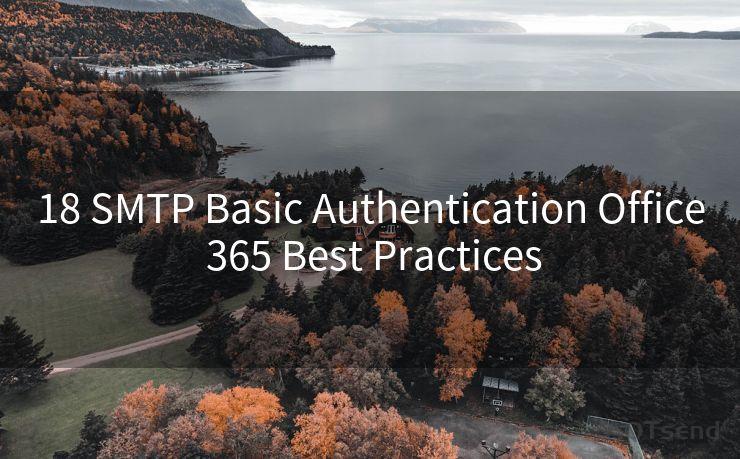18 SMTP Basic Authentication Office 365 Best Practices




When it comes to email communication, SMTP (Simple Mail Transfer Protocol) plays a crucial role. However, with the increasing security concerns, it's essential to follow best practices, especially when using Basic Authentication with Office 365. In this article, we'll explore the top 18 best practices for SMTP Basic Authentication in Office 365.
1. Enable Modern Authentication

Microsoft is phasing out Basic Authentication in favor of Modern Authentication (OAuth 2.0). Enabling Modern Authentication provides a more secure way to authenticate users and should be the first step in securing your Office 365 environment.
2. Disable Legacy Auth for SMTP
Disabling Legacy Authentication for SMTP can reduce the risk of brute force and password spray attacks. This ensures that only modern, more secure authentication methods are used.
3. Use Strong Passwords
Enforce strong password policies for all user accounts. This includes requiring a minimum length, a mix of uppercase, lowercase, numbers, and special characters.
4. Multi-Factor Authentication (MFA)
Implementing MFA adds another layer of security to user accounts. Even if a password is compromised, MFA makes it harder for unauthorized access.
5. Monitor and Alert on Suspicious Activity
Utilize Office 365's built-in security features to monitor and alert on any suspicious login attempts or activities related to SMTP authentication.
6. Regularly Update and Patch Systems
Keep your Office 365 environment and all connected systems up to date with the latest security patches and updates.
7. Restrict Access by IP Address
Limit SMTP access to specific IP addresses or ranges to reduce the attack surface.
8. Use Encrypted Connections
Ensure that all SMTP connections are encrypted using TLS to protect data in transit.
9. Implement DMARC, DKIM, and SPF
These email authentication protocols help validate the origin of emails and prevent spoofing attacks.
10. Audit and Review Permissions Regularly
Periodically review user permissions to ensure that only the necessary access is granted and there are no excessive privileges.
11. Educate Users on Security Best Practices
Provide regular training to users on identifying and avoiding phishing attacks, creating strong passwords, and other security best practices.
12. Implement a Secure Email Gateway (SEG)
A SEG can provide additional protection by filtering inbound and outbound emails for malware, spam, and other threats.
13. Use Dedicated Admin Accounts
Create dedicated admin accounts for managing Office 365 settings to reduce the risk of accidental or malicious changes.
14. Enable Audit Logging
Enable and regularly review audit logs to track any changes made to SMTP settings or user accounts.
15. Consider Third-Party Security Solutions
Explore third-party security solutions that can provide additional layers of protection and monitoring for your Office 365 environment.
🔔🔔🔔
【AOTsend Email API】:AOTsend is a Managed Email Service for sending transactional emails. Support Email Types: reminders, authentication, confirmations, notifications, verification codes, invoices, password resets, account activations, billing statements, two-factor authentication (2FA), and one-time passwords (OTP) emails, etc. $0.28 per 1000 Emails. 99% Delivery, 98% Inbox Rate.
You might be interested in:
Why did we start the AOTsend project, Brand Story?
What is a Managed Email API, How it Works?
Best 25+ Email Marketing Platforms (Authority,Keywords&Traffic Comparison)
Best 24+ Email Marketing Service (Price, Pros&Cons Comparison)
Email APIs vs SMTP: How they Works, Any Difference?
16. Prepare for Emergencies
Have an incident response plan in place to quickly respond to any security breaches or compromises.
17. Regularly Test Security Measures
Conduct periodic penetration testing and vulnerability assessments to ensure your security measures are effective.
18. Stay Informed on Security Threats
Keep up to date with the latest security threats and vulnerabilities to proactively protect your Office 365 environment.
By following these best practices for SMTP Basic Authentication in Office 365, you can significantly enhance the security of your email communications and protect your organization from potential threats. Remember, security is an ongoing process, and it's essential to stay vigilant and proactive in your approach.




Scan the QR code to access on your mobile device.
Copyright notice: This article is published by AotSend. Reproduction requires attribution.
Article Link:https://www.mailwot.com/p6811.html



